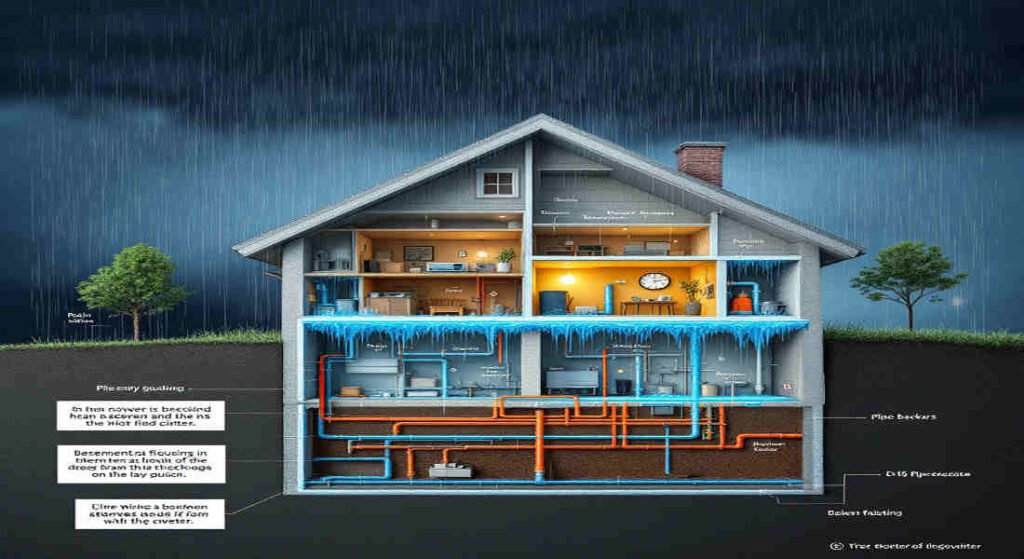Heavy rain is a natural phenomenon that can wreak havoc on homes in more ways than one. While most homeowners might focus on preventing roof leaks or ensuring their basements remain dry, there’s one critical area that often gets overlooked: your home’s plumbing system.
Can heavy rain cause home plumbing issues? Absolutely. The effects of heavy rain can be far-reaching, and your plumbing system, connected to the broader environment, is not immune.
How Heavy Rain Affects Home Plumbing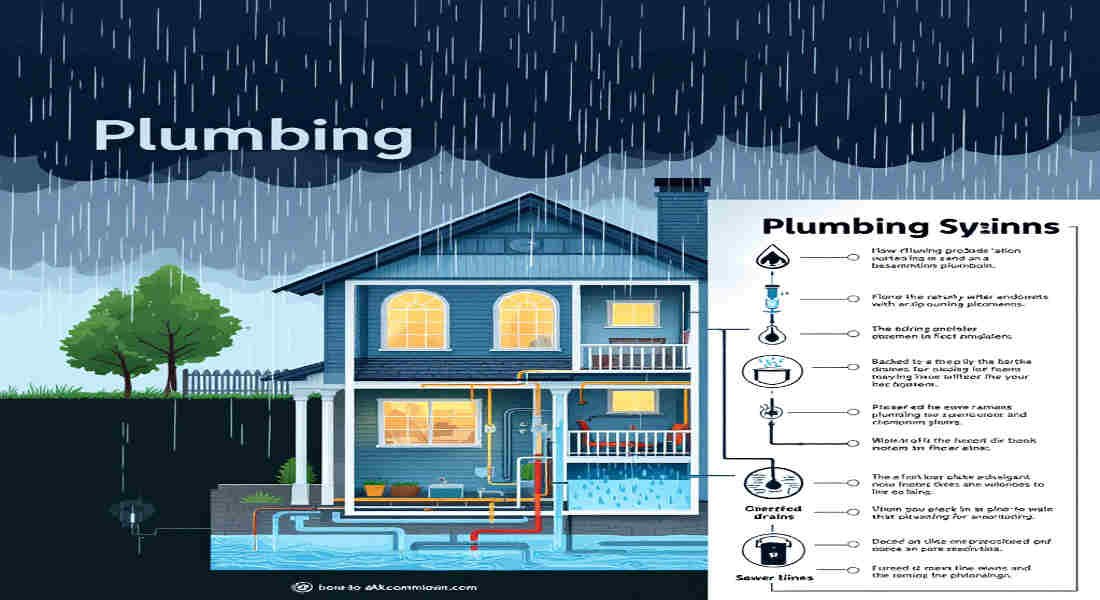
Heavy rain doesn’t just stay on the surface; it seeps into the ground, saturating the soil and increasing water pressure around and inside your home. Much of this water interacts with your plumbing system, and here’s how:
Understanding the Basics of Plumbing Systems
Your plumbing system is designed to handle a specific amount of water flow. It consists of pipes, drains, sewer lines, and fixtures—all working together to carry water in and out of your home. However, when heavy rain hits, the system can face overwhelming stress due to external factors like increased water volume and debris.
Increased Water Volume Around Your Home
Heavy rain saturates the soil, causing water to pool around your home’s foundation. This pooling water creates additional pressure on underground pipes, which may already be vulnerable due to age or minor cracks. The result? Increased chances of leaks, bursts, and other plumbing issues.
Plumbing System Stress
Rainwater doesn’t just create pressure—it also carries debris, mud, and other particles that can infiltrate your system. Over time, these elements can clog drains, increase water pressure inconsistencies, and damage pipes.
Common Plumbing Issues Caused by Heavy Rain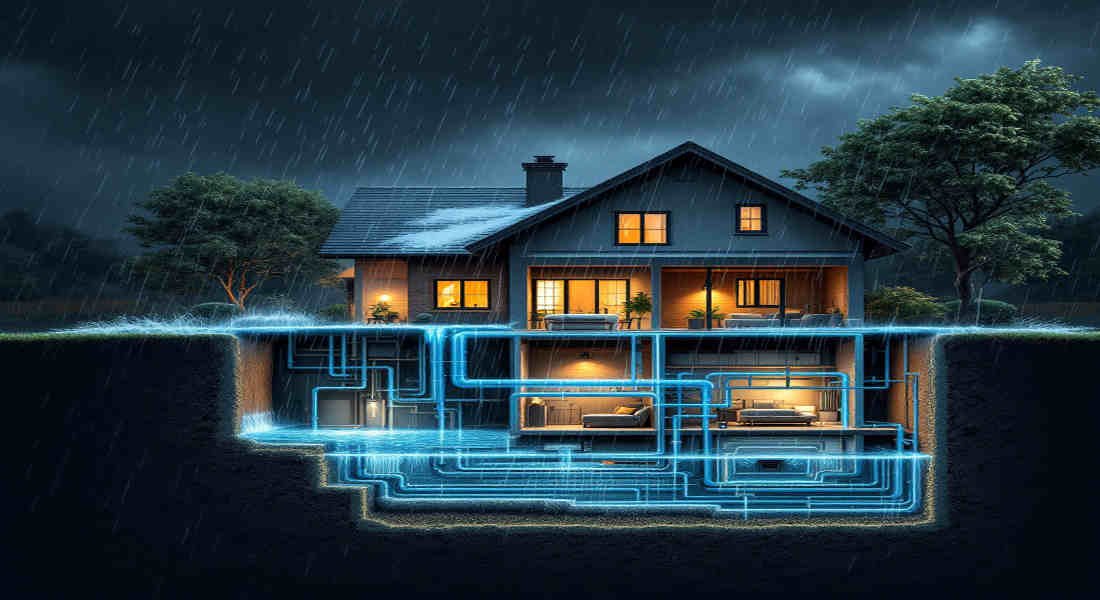
Heavy rain can lead to a cascade of plumbing problems. Let’s explore some of the most common issues homeowners face:
You may also read (clean plumbing pipes at home).
Sewer Backups
When municipal sewer systems become overwhelmed by rainwater, it creates a backlog that can push sewage back into homes.
- Signs to Watch For: Gurgling toilets, slow drains, or foul odours.
- Risks: Property damage, health hazards from raw sewage, and extensive cleanup costs.
Clogged Drains and Blockages
Rainwater often carries debris like leaves, soil, and trash. This debris can accumulate in outdoor drains, gutters, and even kitchen or bathroom pipes.
- How It Happens: Debris enters the system, creating blockages in pipes and preventing water flow.
- Effects: Water pooling in sinks, slow-draining bathtubs, and even flooding in extreme cases.
Foundation Damage and Soil Saturation
When soil absorbs excessive rainwater, it expands and shifts. This movement can destabilise your home’s foundation and impact underground pipes.
- Risks: Pipes crack, shift, or even burst under pressure.
- Signs: Sudden drops in water pressure, unexplained wet spots in the yard, or visible foundation cracks.
Overflowing Gutters and Downspouts
Gutters and downspouts are designed to channel water away from your home, but heavy rain can overwhelm them if they’re clogged.
- Consequences: Water spills over, saturating the soil near your home and increasing the risk of basement flooding.
- Prevention: Regularly clean gutters and consider installing gutter guards.
Sump Pump Failures and Basement Flooding
Sump pumps play a crucial role in keeping basements dry during heavy rain. However, they can fail under excessive water load.
- Signs of Failure: A sump pump that runs continuously, unusual noises, or a flooded basement.
- Risks: Water damage, mould growth, and electrical hazards.
How Heavy Rain Can Cause Specific Plumbing Damage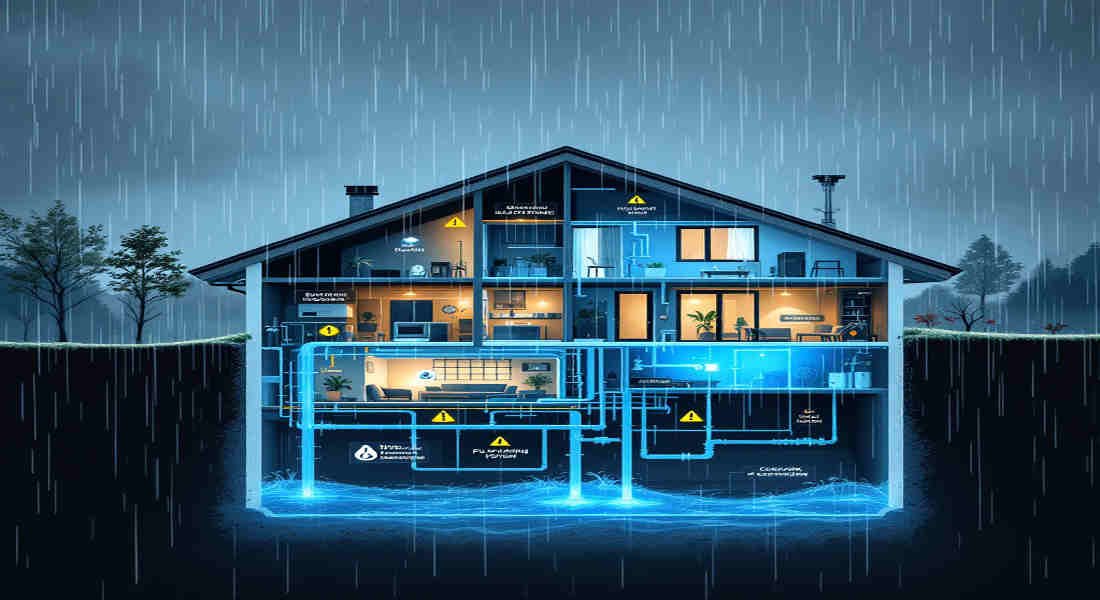
Beyond the common plumbing issues, heavy rain can also directly damage specific components of your plumbing system.
Burst and Cracked Pipes
Heavy rain increases water pressure, which, when combined with soil movement, can lead to pipe damage.
- Signs of Pipe Damage: Discoloured water, low water pressure, or unexplained odours from your plumbing.
- Prevention: Regular inspection and replacement of old pipes can help mitigate this risk.
Water Heater Damage from Flooding
Water heaters, often located in basements, are particularly vulnerable during heavy rain.
- Risks of Submersion: If a water heater is submerged, it can short-circuit or become permanently damaged.
- Preventive Steps: Elevate your water heater or install flood barriers around it.
Preventive Measures for Heavy Rain and Plumbing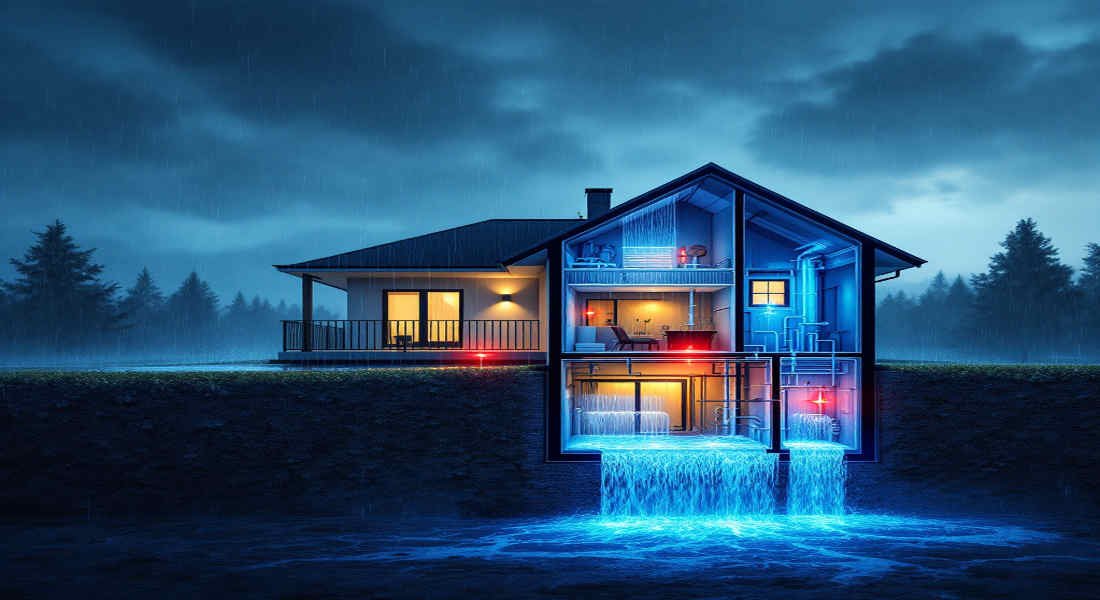
Preventing plumbing issues during heavy rain requires proactive care. Here are steps you can take to protect your home:
Regular Cleaning and Maintenance
- Gutters and Drains: Clear debris like leaves and dirt to prevent clogs.
- Tools to Use: Gutter guards and drain covers are excellent preventive solutions.
Sewer Line Inspection and Backflow Prevention
- Schedule professional sewer line inspections to identify potential vulnerabilities.
- Install backflow preventers to stop sewage from entering your home.
You may also read (plumbing stack at home).
Foundation and Soil Drainage Solutions
- Improve Water Runoff: Install French drains or area drains around your property.
- Landscaping Tips: Grade your lawn to direct water away from your home’s foundation.
Sump Pump Maintenance
- Test your sump pump regularly, especially before rainy seasons.
- Consider installing battery backups or a secondary pump for extra protection.
Pipe Inspections and Upgrades
- Inspect your pipes for signs of wear, rust, or damage.
- Proactively replace old pipes with newer, more durable materials.
What to Do If You Experience Plumbing Issues After Heavy Rain
If heavy rain has already caused plumbing issues, act quickly to minimise damage.
- Immediate Steps:
- Turn off your home’s water supply.
- Avoid using affected drains to prevent further backups.
- Call a Professional Plumber:
- A licensed plumber can assess the damage, recommend repairs, and prevent future issues.
- Timely Repairs Matter:
- Delaying repairs can worsen damage, leading to higher costs and potential health risks.
Long-Term Benefits of Proactive Plumbing Care
Taking preventive measures not only protects your home but also offers several long-term benefits:
- Cost Savings: Avoid costly repairs by addressing small issues early.
- Increased Safety and Comfort: A well-maintained plumbing system ensures your home remains safe and functional during heavy rain.
- Enhanced Property Value: Buyers appreciate homes with a robust and well-maintained plumbing system.
Preventive Measure Benefit Estimated Cost
Regular Gutter Cleaning Prevents clogs and water damage, $100-$300 annually.
Sewer Line Inspection Avoids backups and major repairs, $200-$400 per inspection.
Sump Pump Maintenance Keeps basements dry during heavy rain, $150-$500 for maintenance.
You may also read (home plumbing first appear).

